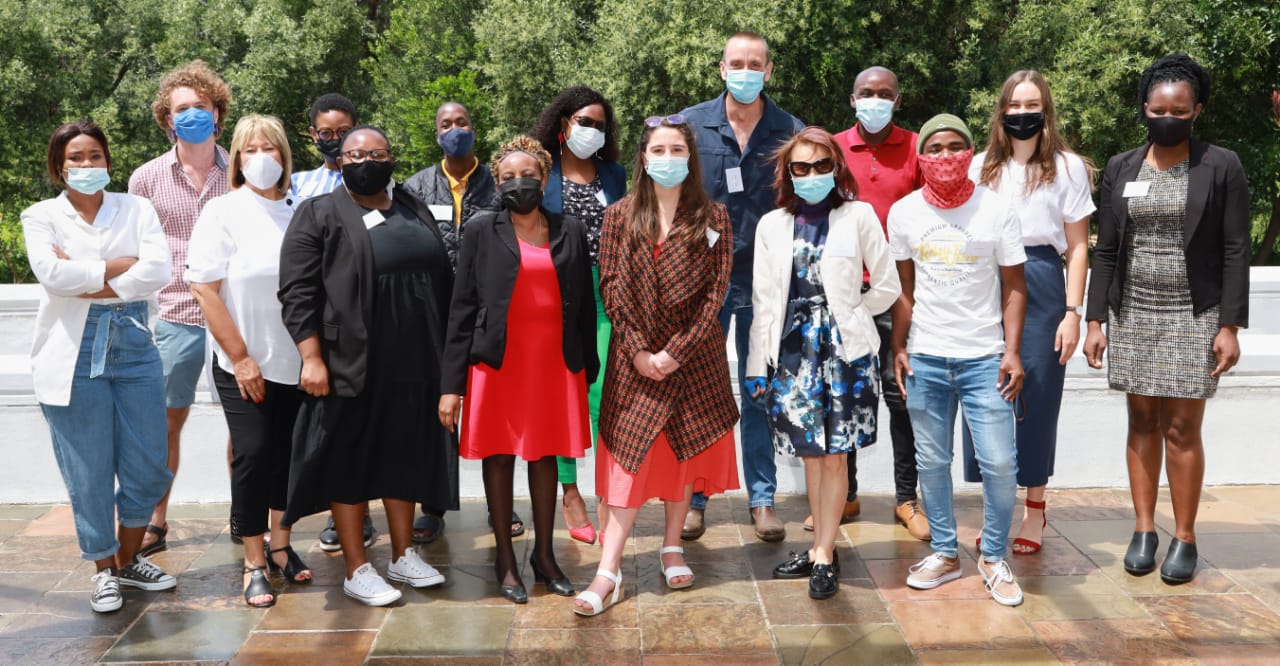
by jmusango | Dec 9, 2021 | News
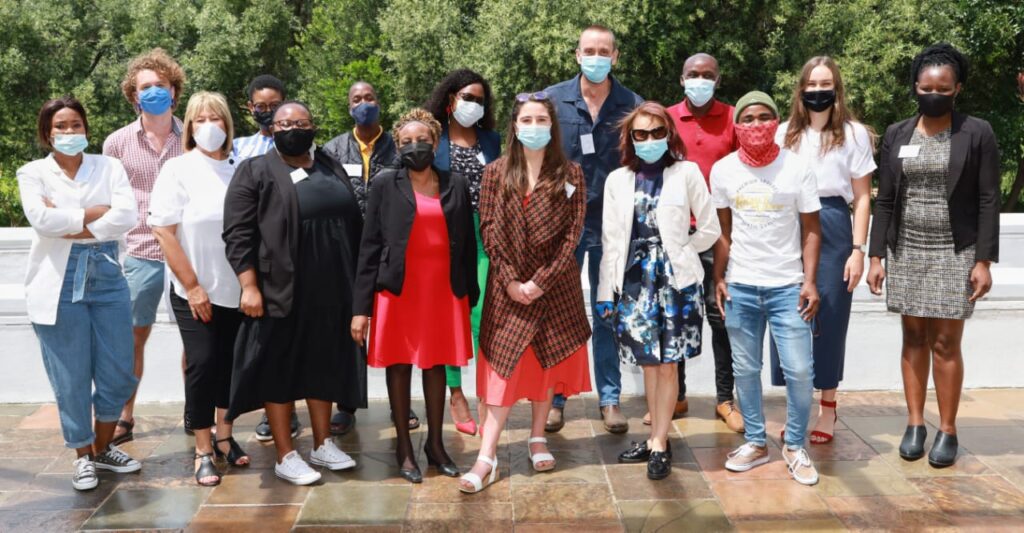
Over the last two years, the GENS researchers have been exploring gendered perspectives to the urban household energy transition, with two case studies in South Africa and Kenya. As a follow-up to the Energy and Gender in South Africa workshop held on 24 March 2021, GENS Trilateral Chair held its second multi-stakeholder engagement workshop in South Africa on 23 November 2021. The workshop was themed: “A Gendered Perspective in Urban Household Energy Transition”.
The workshop objectives were to:
- to disseminate research-based evidence on gendered perspective in the urban household energy transition and
- to engage in multi-stakeholder dialogue on how we can integrate gendered in the urban household energy transition.
The workshop was in a hybrid format, virtually on Zoom and at the Stellenbosch Institute for Advanced Study (STIAS) in Stellenbosch.
It brought together 32 stakeholders, who were:
-
- researchers from the GENS team, other Universities in South Africa, and international institutions in the Netherlands, UK and Spain;
- representatives from government departments including, Drakenstein Municipality and Commission for Gender Equality;
- funder representative from British Council;
- representatives from industry and business including Divaine Growth Solutions, SADC Centre for Renewable Energy and Energy Efficiency, Zonke Energy, Ikigai Engineering and Green Building Council for South Africa; and
- Groenheuwel community members, including community liaison, co-researchers and youth champions in the GENS research.
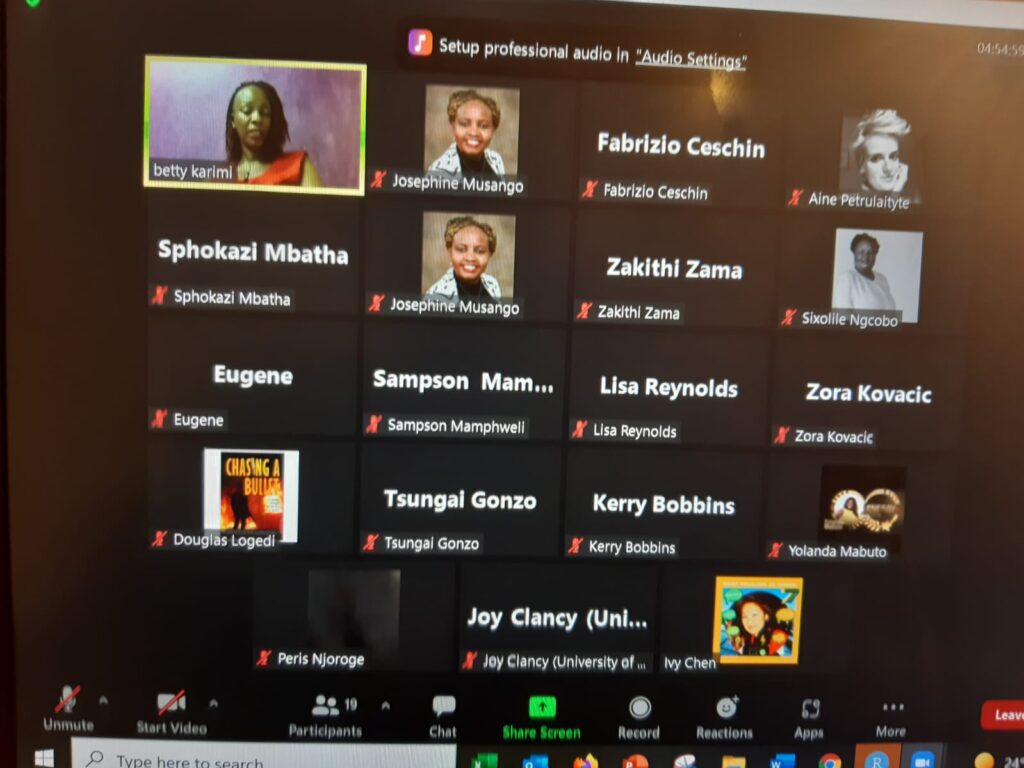
Prof Zwelizima Ndevu, the Director of the School of Public Leadership at Stellenbosch University (SU), welcomed the stakeholders. He commended the GENS Trilateral Chair for producing research that speaks to the current needs in South Africa and is relevant to our communities. A question of “how do we involve ESKOM in these deliberations” emerged from Prof. Ndevu’s closing remarks when alluding to the rife electricity shortages in South Africa.
The GENS researchers disseminated ongoing work in three sessions. The first session focused on gendered energy transition in urban households in three case studies. Prof Josephine Musango, GENS Chairholder, presented the GENS work packages one and four and the Groenheuwel case study. The presentation highlighted the theoretical frameworks developed, engagements in the GENS living lab in Groenheuwel, and emerging results from quantitive data. Ms Christer Anditi, a Doctoral researcher at SU, highlighted the gender roles in Mathare informal settlement. In contrast, Ms Andelia Chicombo, a doctoral researcher at SU, shared findings of gendered household transitions in Maputo, Mozambique.
The second session focused on integrating gender in energy innovations. Dr Fabrizio Ceschin, the Principal Investigator at Brunel University London (BUL), presented on the GENs work package two. He highlighted the co-designing and prototyping activities expected through co-design workshops with practitioners and in the living labs in Groenheuwel and Mathare. Dr Aine Petrulaitype, Postdoctoral research in BUL, showcased a co-design toolkit and the process in which it was developed, its features and the testing process. Ms Lelani Oosthuizen, Masters researcher at SU, showcased a capability maturity model to evaluate gender mainstreaming in the energy project value chain.
The third session focused on the policy perspective of energy and gender. Dr Betty Mwiti, the Principal Investigator at the University of Nairobi (UoN), highlighted the existing outcomes of GENS Work package three. She showcased the ongoing multi-stakeholder engagements with the National Commission for Science and Technology Innovation in Kenya. Ms Njoroge, a Doctoral researcher at UoN, shared results on gender framing in policy based on 34 energy sector documents in sub-Saharan Africa. Dr Ivy Chen, a Postdoctoral researcher at SU, presented on monitoring and evaluation for policy.

After each session, the participants shared their views on slido in a facilitated session. Networking and being a problem-solver emerged as what the participants wanted to achieve at the end of the workshop. The workshop report report will be released soon.

by jmusango | May 21, 2021 | News
On 21 May 2021, GENS chairholder, Prof Josephine Musango, participated as one of the panellists at the launch of the OECD gender and Environment nexus. The environment is linked to SDG 7 on affordable and clean energy and SDG 11 on sustainable cities and communities.
The report shows that:
- Environmental degradation impacts women and men differently.
- Few countries use gender-disaggregated data in environmental policymaking.
- The policy can advance gender equality, the SDGs and inclusive green recovery.
Access the OECD gender and environment report here.
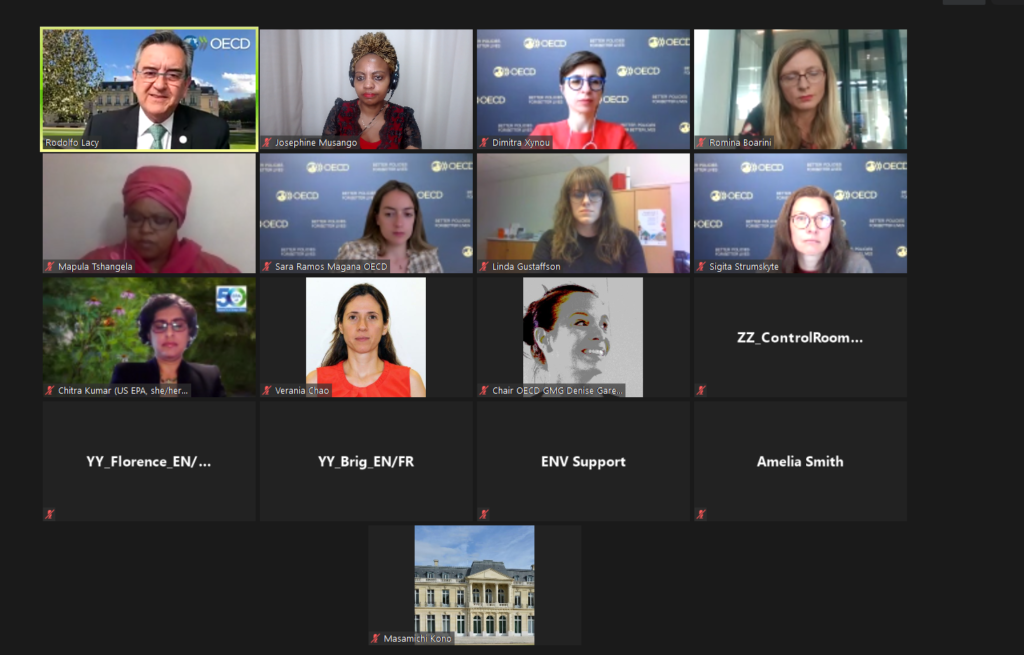
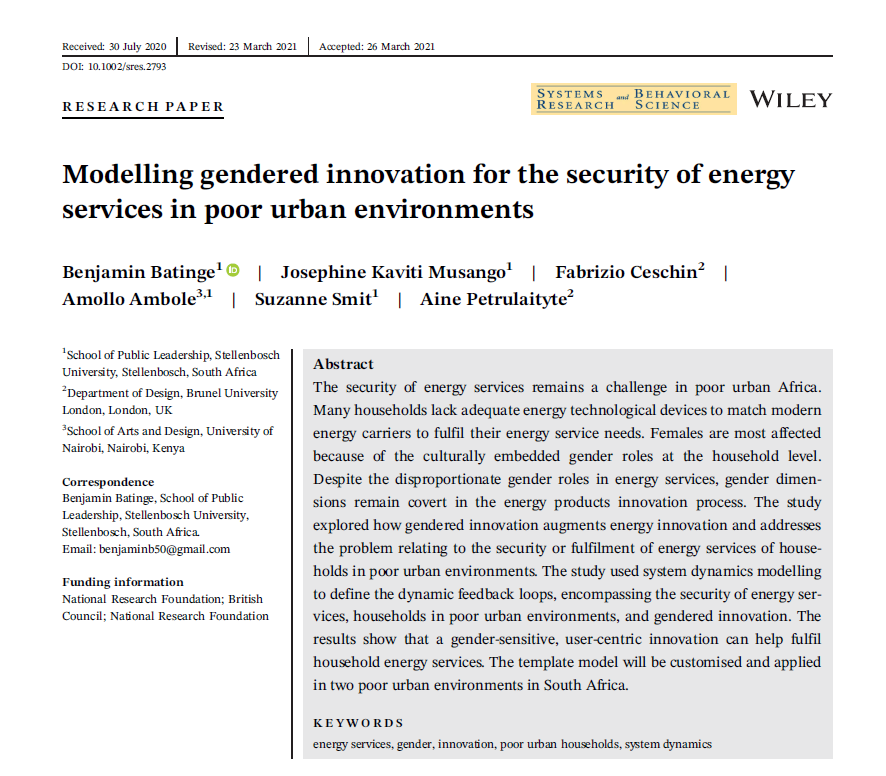
by jmusango | Apr 16, 2021 | News
 System dynamics is a way of thinking and doing things from a holistic approach. As part of contextualising the problem of mainstreaming gender in poor urban environments, GENS Team published a journal paper using the system dynamics method, led by our former GENS postdoctoral fellow, Dr Benjamin Batinge and co-authored by Prof Josephine Musango, Dr Fabrizio Ceschin, Dr Amollo Ambole, Dr Suzanne Smit and Dr Aine Petrulaityte.
System dynamics is a way of thinking and doing things from a holistic approach. As part of contextualising the problem of mainstreaming gender in poor urban environments, GENS Team published a journal paper using the system dynamics method, led by our former GENS postdoctoral fellow, Dr Benjamin Batinge and co-authored by Prof Josephine Musango, Dr Fabrizio Ceschin, Dr Amollo Ambole, Dr Suzanne Smit and Dr Aine Petrulaityte.
The study showed that taking a gender gender-sensitive and user-centric approach to energy innovation and solutions for household energy services can improve social acceptability. Further, it can improve the suitability of solutions in specific contexts and fulfil the households’ energy services in poor urban areas.
Gender-sensitive and user-centric solutions may also lead to a decline in the total poor urban population, which we defined based on income level because energy service fulfilment could impact the overall income through energy service-driven entrepreneurship.
Well done, GENS Team!
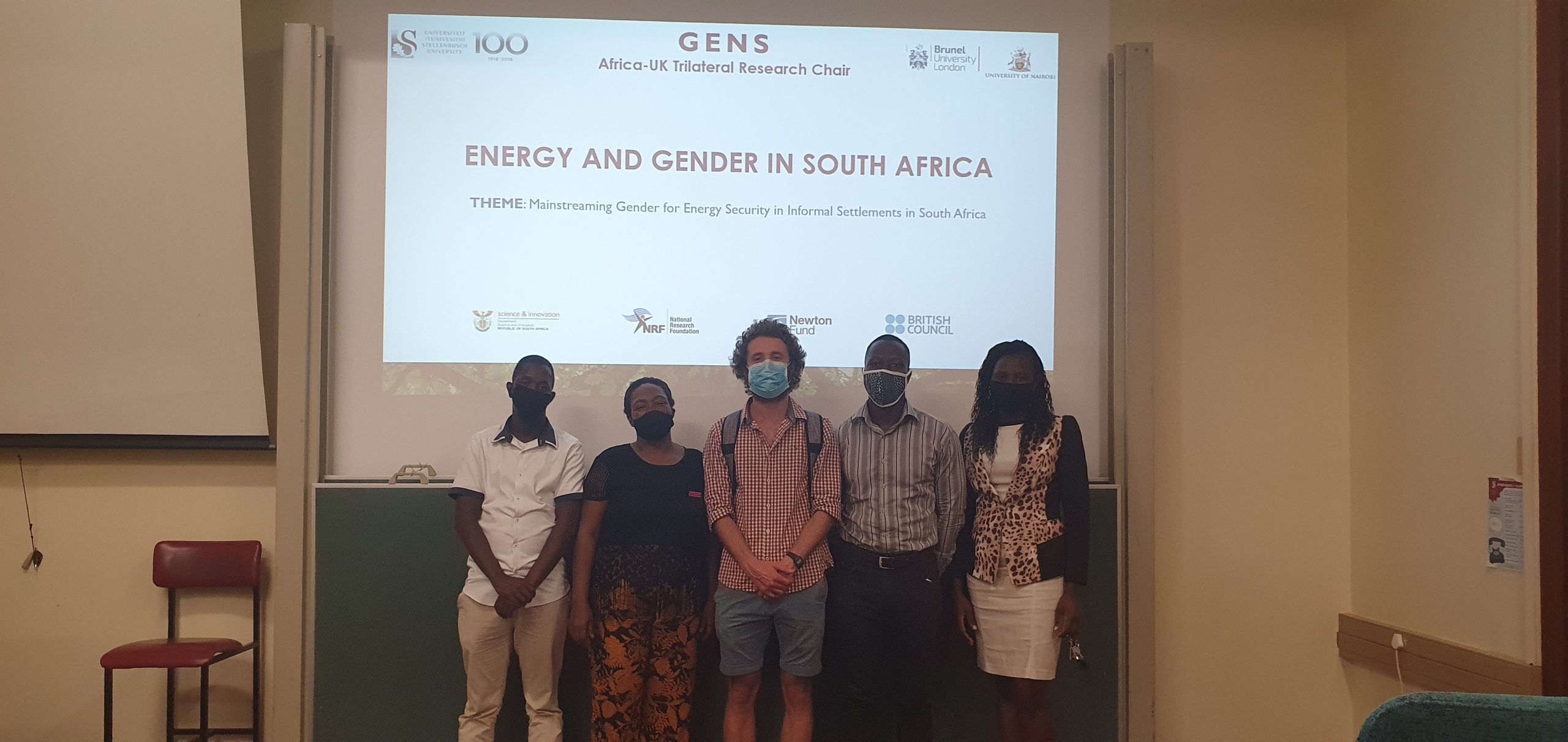
by jmusango | Apr 9, 2021 | News
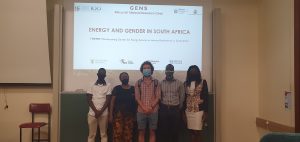 GENS held a first virtual stakeholder engagement workshop on Energy and Gender in South Africa on 24 March 2021. The workshop was themed Mainstreaming gender for energy security in informal settlements in South Africa and brought together 30 stakeholders, who were from the Department of Mineral Resources and Energy, Drake nstein Municipality, business, Groenheuwel community members, academics, and GENS Team from the three collaborating institutions, Stellenbosch University, Brunel University London and GENS Hosts Energy and Gender in South Africa Stakeholder Workshop of Nairobi (see Photo 1 showing screenshot). Six stakeholders were in one virtual room.
GENS held a first virtual stakeholder engagement workshop on Energy and Gender in South Africa on 24 March 2021. The workshop was themed Mainstreaming gender for energy security in informal settlements in South Africa and brought together 30 stakeholders, who were from the Department of Mineral Resources and Energy, Drake nstein Municipality, business, Groenheuwel community members, academics, and GENS Team from the three collaborating institutions, Stellenbosch University, Brunel University London and GENS Hosts Energy and Gender in South Africa Stakeholder Workshop of Nairobi (see Photo 1 showing screenshot). Six stakeholders were in one virtual room.
The objective of the workshop was to bring together the different stakeholders, including government, industry, academics, researchers and the Groenheuwel community, to discuss the question: How might we build research capacity, harness industry expertise, and frame policy to promote gender-informed innovation and commercialisation opportunities in alternative energy technology and services in the informal settlements in South Africa.
Prof Zwelizima Ndevu, the Director of the School of Public Leadership, welcomed the stakeholders and expressed his support for the workshop that links researchers, community members and government stakeholders to come up with “home-grown solutions.”
Notable invited speakers were: Ms. Elizabeth Marabwa, Chief Director, Programmes  and Project Management Office at the Department of Mineral Resources and Energy (DMRE). Ms. Marabwa presented the DMRE mandate in the energy sector, the policy framework that supports gender and energy, existing programmes at DMRE, and challenges that serve as a barrier to women’s participation. Although challenges to include women in the energy sector remain, the question is how to turn these into opportunities through collaborative efforts.
and Project Management Office at the Department of Mineral Resources and Energy (DMRE). Ms. Marabwa presented the DMRE mandate in the energy sector, the policy framework that supports gender and energy, existing programmes at DMRE, and challenges that serve as a barrier to women’s participation. Although challenges to include women in the energy sector remain, the question is how to turn these into opportunities through collaborative efforts.
Mr. Moses Mlangeni, the Manager: Economic Growth and Development at Drakenstein Municipality, Paarl, gave an overview of informal settlements in Drakenstein, the energy situation in Groenheuwel informal settlement, ongoing initiatives in Groenheuwel and opportunities for synergy with the GENS research. Some synergy opportunities include solutions to the supply of energy in buildings that serve the informal settlement population and reduce “Isinyoka.”
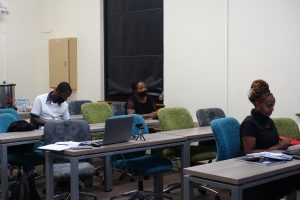 Two community co-researchers, Mbulelo Ngalo and Brenda von Willingham expressed their experience being part of GENS research, and Ms. Gail Jacobs, currently serving as a community liaison at the Groenheuwel community, shared insights on how to encourage community stakeholders to become change agents in their community.
Two community co-researchers, Mbulelo Ngalo and Brenda von Willingham expressed their experience being part of GENS research, and Ms. Gail Jacobs, currently serving as a community liaison at the Groenheuwel community, shared insights on how to encourage community stakeholders to become change agents in their community.
The GENS team also had several presentations: Prof Musango presented how we are conceptualising gender mainstreaming in GENS. Dr. Ceschin discussed how GENS aims to support different stakeholders in codesigning, prototyping and testing gendered solutions in the GENS living lab. Further, Dr. Mwiti highlighted why we are co-facilitating multi-stakeholder engagements. Ms. Njoroge discussed how the existing literature frames gender in Africa policy landscapes, and lastly, Dr. Mukama described the GENS living lab’s set-up in Groenheuwel.
The expected outcome was to forge networks with different stakeholders and gain perspectives on building research capacity, harness industry expertise and frame policy to promote gendered energy solutions.
Some key highlights and messages that emerged during the workshop are the following:
- Gender is not equal to women. Gender mainstreaming is about engaging both men and women in innovating solutions. It is not only about the number of women involved but also the quality of experience of both women and men.
- How we frame gender determines the response we take at policy, industry, research, and community level.
- The vibrant and interactive workshop with the action plan that flowed from the multi-stakeholder workshop groups sets the next engagement scene.
The next GENS Stakeholder workshop in South Africa will take place on 13 October 2021.
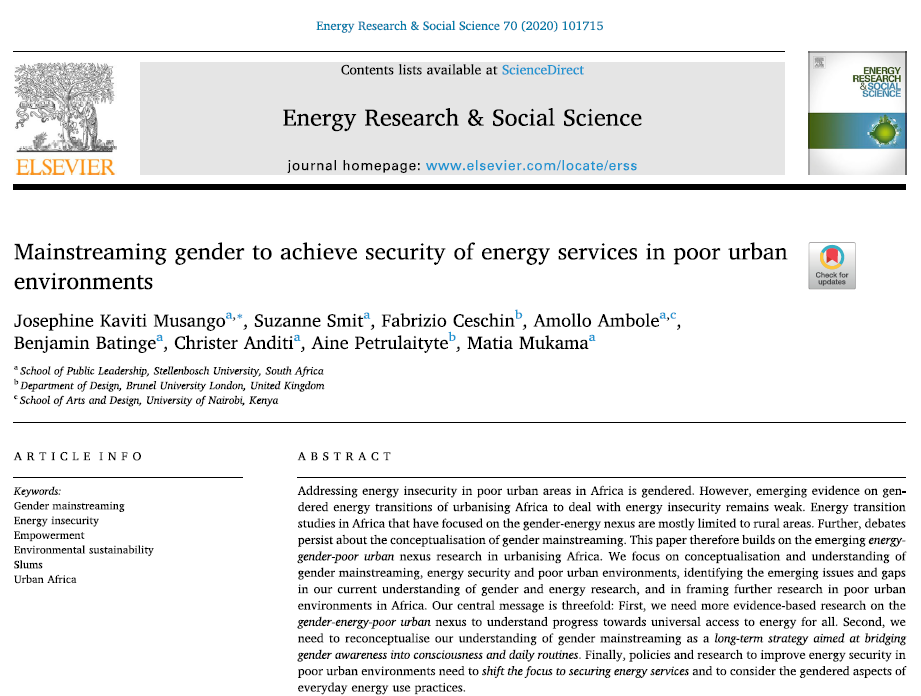
by jmusango | Aug 17, 2020 | News
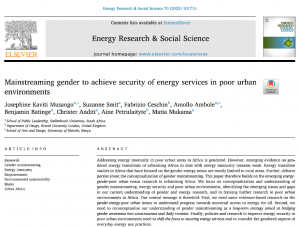 Two questions the GENS Team frequently get asked when we mention the name of the Africa-UK Trilateral Research Chair, Mainstreaming Gender for Energy Security In Poor Urban Environments are:
Two questions the GENS Team frequently get asked when we mention the name of the Africa-UK Trilateral Research Chair, Mainstreaming Gender for Energy Security In Poor Urban Environments are:
(i) What do you mean by “mainstreaming gender”?
(ii) What do you mean by “energy security” OR “energy insecurity”?
As such, the GENS Team has published its first co-authored paper, which highlights what we mean by three keywords in the Trilateral Chair, namely: mainstreaming gender, energy security, and poor urban environments.
The paper was published in the Energy Research & Social Science, and international Journal with an impact factor of 4.771.
The GENS Team aim to communicate and clarify these keywords to the diverse stakeholders who we are engaging in the research process.










 GENS held a first virtual stakeholder engagement workshop on Energy and Gender in South Africa on 24 March 2021. The workshop was themed Mainstreaming gender for energy security in informal settlements in South Africa and brought together 30 stakeholders, who were from the Department of Mineral Resources and Energy, Drake nstein Municipality, business, Groenheuwel community members, academics, and GENS Team from the three collaborating institutions, Stellenbosch University, Brunel University London and GENS Hosts Energy and Gender in South Africa Stakeholder Workshop of Nairobi (see Photo 1 showing screenshot). Six stakeholders were in one virtual room.
GENS held a first virtual stakeholder engagement workshop on Energy and Gender in South Africa on 24 March 2021. The workshop was themed Mainstreaming gender for energy security in informal settlements in South Africa and brought together 30 stakeholders, who were from the Department of Mineral Resources and Energy, Drake nstein Municipality, business, Groenheuwel community members, academics, and GENS Team from the three collaborating institutions, Stellenbosch University, Brunel University London and GENS Hosts Energy and Gender in South Africa Stakeholder Workshop of Nairobi (see Photo 1 showing screenshot). Six stakeholders were in one virtual room. and Project Management Office at the Department of Mineral Resources and Energy (DMRE). Ms. Marabwa presented the DMRE mandate in the energy sector, the policy framework that supports gender and energy, existing programmes at DMRE, and challenges that serve as a barrier to women’s participation. Although challenges to include women in the energy sector remain, the question is how to turn these into opportunities through collaborative efforts.
and Project Management Office at the Department of Mineral Resources and Energy (DMRE). Ms. Marabwa presented the DMRE mandate in the energy sector, the policy framework that supports gender and energy, existing programmes at DMRE, and challenges that serve as a barrier to women’s participation. Although challenges to include women in the energy sector remain, the question is how to turn these into opportunities through collaborative efforts. Two community co-researchers, Mbulelo Ngalo and Brenda von Willingham expressed their experience being part of GENS research, and Ms. Gail Jacobs, currently serving as a community liaison at the Groenheuwel community, shared insights on how to encourage community stakeholders to become change agents in their community.
Two community co-researchers, Mbulelo Ngalo and Brenda von Willingham expressed their experience being part of GENS research, and Ms. Gail Jacobs, currently serving as a community liaison at the Groenheuwel community, shared insights on how to encourage community stakeholders to become change agents in their community.
 Two questions the GENS Team frequently get asked when we mention the name of the Africa-UK Trilateral Research Chair, Mainstreaming Gender for Energy Security In Poor Urban Environments are:
Two questions the GENS Team frequently get asked when we mention the name of the Africa-UK Trilateral Research Chair, Mainstreaming Gender for Energy Security In Poor Urban Environments are: